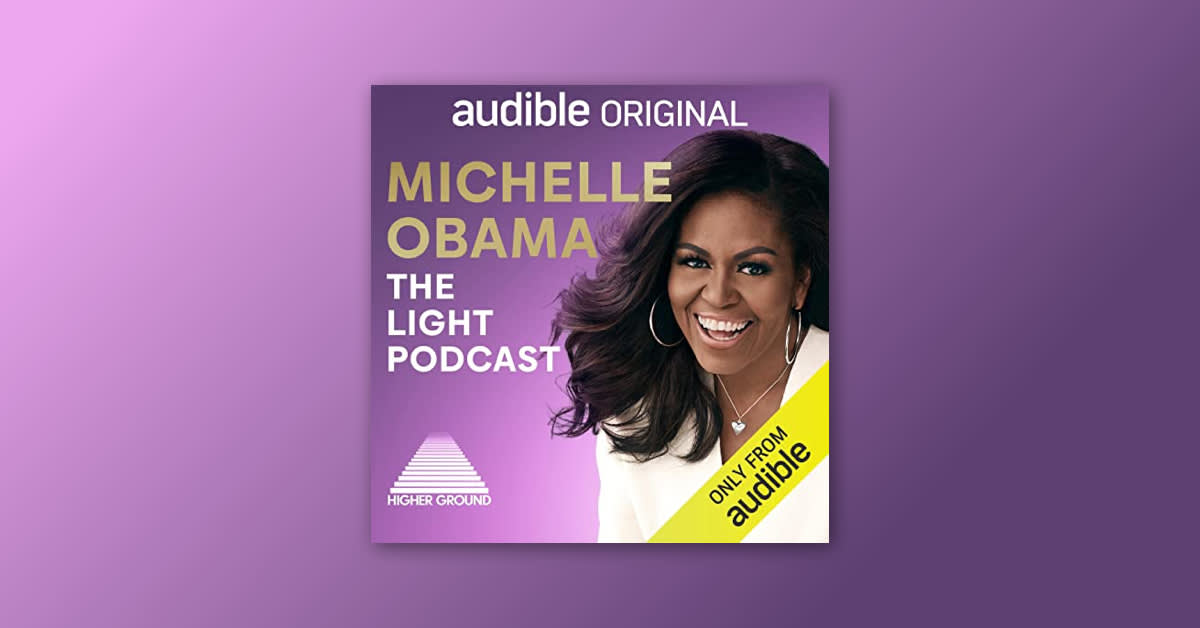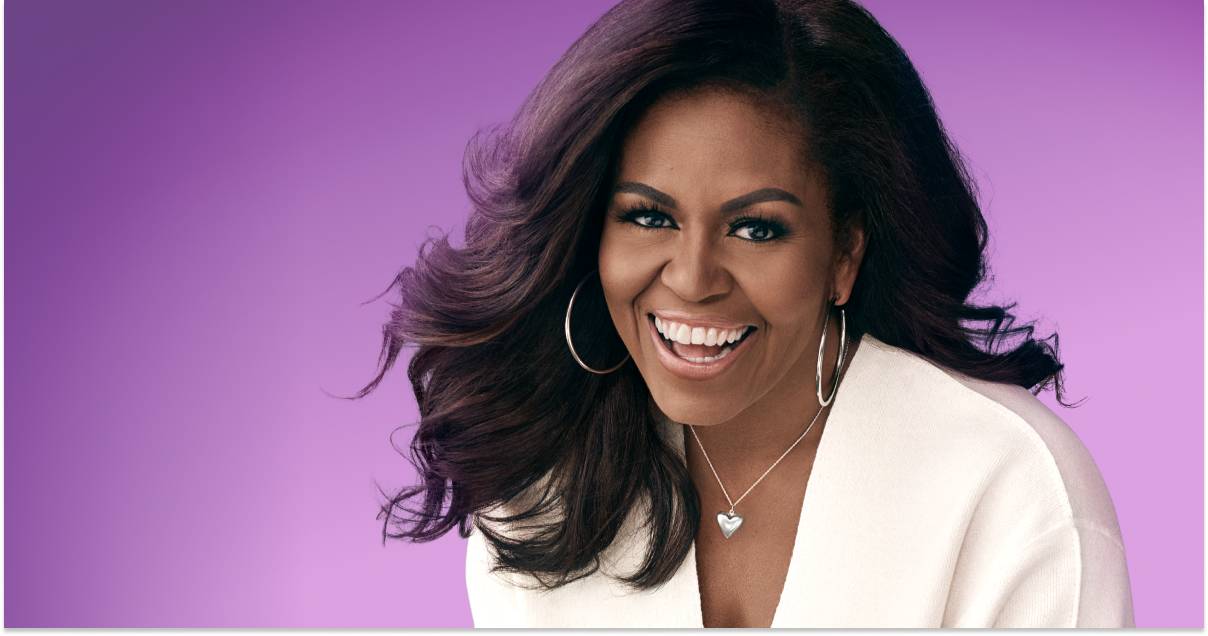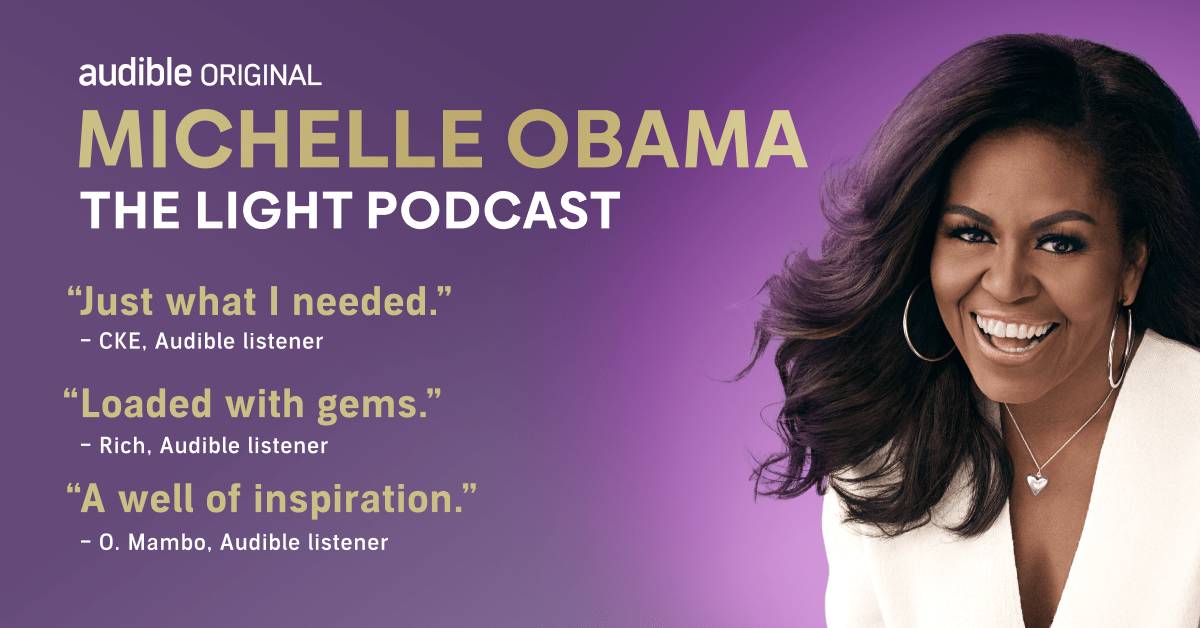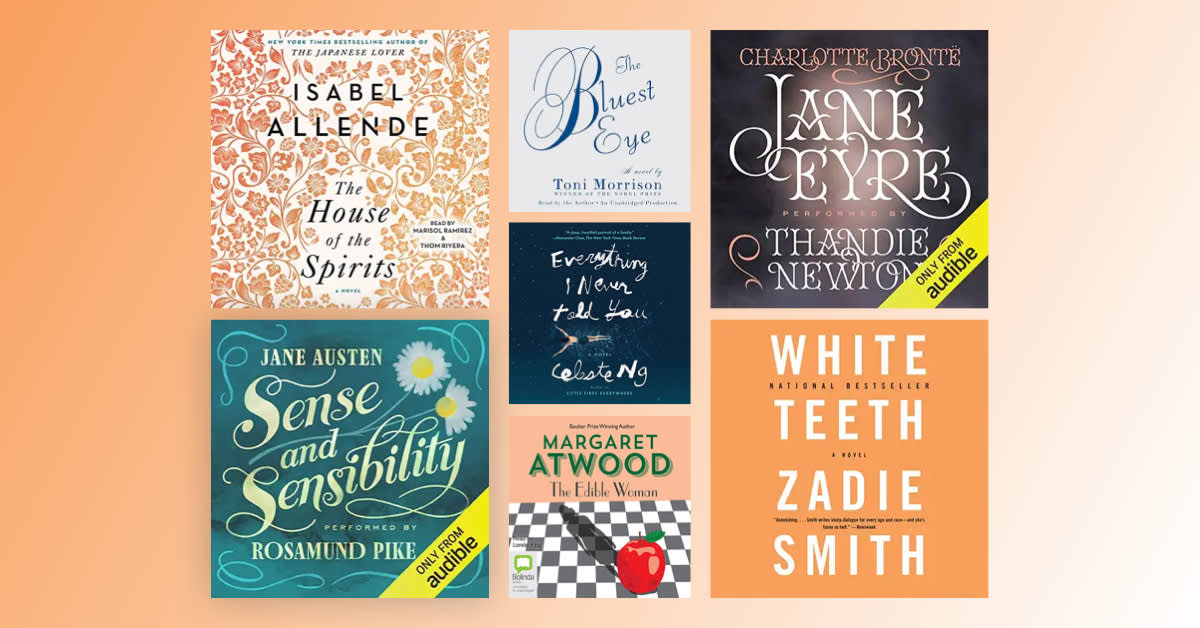Michelle Obama: The Light Podcast
Heather McGhee, Chicago
Bonus Episode, Episode 11
Little Everywhere / Higher Ground Productions / Audible
Heather McGhee:
Let's give a warm welcome on your feet for our forever First Lady, Michelle Obama.
Michelle Obama:
Hi everyone. I'm Michelle Obama, and this is a special bonus episode of The Light Podcast. Do you ever have days when the state of the world just weighs you down? Not to mention everything that's going on at work, school, and in life, the kind of days when you just want to crawl back into bed? Me too. Over the years I've learned that those are the days when I need to connect with people the most. Even if my instinct is to just hole up by myself. We all need that sense of connection with our friends, our loved ones, our communities, and that's always true. But it's especially true during tough times. Connecting is easier said than done, of course, but so much of overcoming is about finding the courage to take that first step. That's what I get into with the brilliant Heather McGee in this final bonus episode of The Light. Heather is a bestselling author and commentator who has explored hope, fear, and how we come together during divisive times through her extensive work on race. During our conversation, no topic was off limits, and we addressed some of the challenges of the past few years head on. It was a powerful discussion and I hope it means as much to you as it did to me.
Heather McGhee:
All right, let's get into it.
Heather McGhee:
One of the things that was robbed from us with the pandemic was the ability to have casual encounters that might blossom into friendships, being able to see our close friends if they were not in our little pods. And so the Surgeon General talks about isolation and loneliness as being as bad for your health as a pack-a-day cigarette habit.
Michelle Obama:
See, and let's say that again. Right? Right. Truly because we don't understand that and we are raised in this individualistic society where go it alone, you are rewarded because you're taking it on your own. And we as women do that too. We think we're supposed to monitor ourselves that there's strength in the fact that we don't ask for help. I tell my daughters this, I tell the young people that I work with that we weren't meant to do this life alone. We weren't built that way and we felt it in this quarantine period, but because we don't prioritize it, we don't talk about how important community really is. That this whole thing about going it on your own and being tough, that that is not what humans are supposed to do. Then we haven't practiced it and we put it lower and lower on our priority list.
And for me, my kitchen table is one of my most powerful tools. Even as a young person, you had burdens in school. You were dealing with crazy teachers that weren't teaching you, people who were lowering their bar for you folks in the playground. I call it the wild, wild west of childhood. And my girlfriends even at the time, we were each other's confidants because even as a young person, you can't hold on to that negative energy. You got to have some place to let it out. And as my mother would say, because listen to our little complaints and do the really is that so? And then she'd just remind us that we were okay and she'd send us back to school and we felt more empowered even though nothing had changed. And I was lucky to have a kitchen table that was safe. That was the first place I found my voice because I had parents fortunately, who were glad to see me. They encouraged us to have our opinions. They listened to us as if our voices mattered.
Heather McGhee:
It is such a gift sometimes, as I'm sure you do, I get asked, how do you stay hopeful? And the thing that I come back to is our ancestors. And I think to myself, they had to face so much more,
Michelle Obama:
So much more.
Heather McGhee:
With so much less, and they did not despair. If they had despair, we would not be here. That's right. So who are we to despair? That's-
Michelle Obama:
Right. And I also think about that when it's time to vote.
Heather McGhee:
Oh, yes.
Michelle Obama:
And I don't intentionally want this to be political, but it is a thing when I think about all the people who sacrificed and fought and my father stood in line on his crutches. He never missed voting, ever, never used his disability or the reign or I don't care, or that vote didn't help me and we were poor. You might say that every time he voted, he never got some direct benefit from his vote. Right. But he was voting for us. So I think about that when I see people and young people in particular who don't bother to exercise that right with little to no excuse because our ancestors fought to make sure that we were engaged in that way. So it's never too hard for me to vote or to be engaged or to stay informed for that very reason.
I think about where we are and what's got us all so stuck and so anxious. Fear keeps coming to mind because when I look at the news and I hear the voices, it's like people are playing on our fear. There are people who are trying to lead and gain power by making us afraid of each other and of ourselves. It is a powerful emotion because fear, we need it. We need anxiety. It's an important marker, especially if you're poor. You're other. You're a woman, you're a minority. Fear is an important emotion that guides you towards safety, but it can also keep you stuck. And I write about the legacy of my grandfathers who were all brilliant men, but they were raised in segregated south. Many of them migrated the north, they migrated to the north. My grandfather dandy, my father's father and my grandmother Lavo.
But that man was a brilliant man. He should have been a chemical engineer, but because he was a black man in America, he was a postal worker, he couldn't get in a union. There were limits to what he could be. And those limits made him angry and they made his world small because he was frustrated and bitter in a way that made his world small. Same thing with my grandfather, south side, who was another brilliant man who was a carpenter. His world was small, he just didn't like white people, period. And it was as plain as that. And he kept his family close because that meant safety. My parents didn't want us to grow up with those fears. So my mom at an early age started pushing us to do for ourselves, making us walk to school, setting an alarm, do your own homework. Her theory was, I want to work myself out of a job because her notion was she wanted to replace our fear with competence.
They couldn't give us an inheritance, they couldn't give us title or wealth, but they could give us the ability to manage our own lives. And she wanted to do that early. So that meant her pushing me early to do things that she would never do. The whole notion that we want to away to college. That was a big deal. She would never let our fears make us say no. So by the time I got older, you learn that when you're about to do something new, something hard, the first thing you feel is, oh my God, no, I do not want to be uncomfortable. I do not want to have that feeling. But what I try to tell young people is that the more you practice pushing past that initial no, you learn that there's growth on the other side of those opportunities. And I say that because it's not like the fear ever completely goes away.
I'm nervous every time I walk out on stage. I'm nervous. Before a big speech, I was nervous when Barack me to support his run for the presidency. And parents, we have to get our fears out of the way. And that as a parent, that is a hard thing to do, is to hand your child their life and get out of the way. But if we don't let them practice their lives, we can't wait until they're 20, 25 to say, okay, now let's see what you do with it. I've been telling you what to do all this time. That is a hard thing to do, to watch them own their lives, to make mistakes, to not helicopter them, allowing them to face their fears, to try on some failure early and often and stand at the gate and watch them come and go. My parents did that for me. So I was very practiced at trying hard things.
Heather McGhee:
You've mentioned now January 6th a couple of times, we've got to talk about that. We've got to talk about that. You write in the book that you lost hope in that moment, and I want you to tell us the story of when you had that hope restored. What was that moment?
Michelle Obama:
Well, there were a series of moments. I had to write a convention speech. And there's something about the clarity for me of writing stuff down that helps sort through my mind when you're just thinking the worst is always the worst. It just spirals into most of the worst. And I had to do a convention speech where I had to bring out something hopeful and I had to remember all the things I said. It's like, yes, we're in a Covid situation. There was George Floyd, Black Lives Matter, but there's also the goodness in America. There are also people marching. There were people of all races marching on behalf of criminal justice and racial equity. We can't forget that. We can't forget the fact that neighbors were helping neighbors. There is the flip side of that. And for me, writing helped me see that. But I also had the privilege of standing on the inaugural stage when President Biden was sworn in and there were the contrast, if you recall. I was also on the stage the time before, but the difference in the energy on those stages because in the first inauguration after my husband to look around that stage and see all sameness-
Heather McGhee:
In 2016.
Michelle Obama:
In 2016, there was no diversity on that stage. None. And that was Congress, that was the Supreme Court. Those were all the supporters. And it was like, okay, this is what you meant by make America great again. This was the personification to be able to be back on that stage after January 6th. And that was a difficult time because the riots had just happened. It was days later. It was days later. We were all not clear whether the security would be on par. I told some of my staff that usually accompanied me not to come because we have secret service and if something popped off, we couldn't be guaranteed that everybody would get out. We had to think about that. Is that.
Heather McGhee:
Yes, that's what the kids say.
Michelle Obama:
Oh yeah, right. I do still have young people. I was like, what did I say? Oh, something popped off. Right, right.
But that was one of those situations where something could have popped off. That is the exact proper use of that term, but that's also where you saw a different kind of energy. You saw a country kind of reclaiming itself, and you had Amanda Gorman, that young, brilliant poet. I got to talk to her afterwards. And what I didn't realize that Amanda Gorman, with all of her eloquence, that she had a speech impediment growing up, that she grew up not being able to say the letter R all her whole life. And it took her all this time to work with therapists. And she got into poetry because she was using words to help overcome her, challenge her despite her difficulty. And through that she found poetry and she became a poet laureate. So on that stage, that day, I was reminded of how we can use our challenges even as a nation, we can go through some of the darkest times and use those despite those times.
Like my father used his canes, his crutches. Once again, staying resilient. Amanda didn't succumb to her speech impediment. She used it as her superpower. That's right. And now she is one of the most foremost orators in the world. That's the kind of hope. Those are the kind of stories that if your mind is clear and clean, you can see that it's all there. We are that country. And I guarantee you, because if we weren't, I would let you know I have traveled everywhere. That's right. I've been in every little rural community in towns, black, white, green. I don't care whether they liked us or not. People were decent. I never had an issue as First Lady. Most of the stuff that happened to me happened by the press behind the scenes, people who didn't know us. But everyone, this is what I want us to know.
Everyone is just trying to get through life, truly. Folks aren't out to get each other. People are struggling. They just want to put food on the table. They want to have a chance to educate their kids. Kids, for the most part, are decent. They are trying to make their parents proud. That's who we are. But if you have the wrong leader who tells you a different story about who we are, it is easy to slip into, back into our sameness, starting to be afraid of each other, stuck in our newness, our familiarity, not talking to each other and letting other people talk about us in our ears. To me, what we have to remember, I want our young people to remember that, that that's who America is through and through, regardless of what you see on their news, regardless of who's standing in front of a rally trying to get you worked up over some nonsense, that is what America is. And it has been that for a long time. And I think this generation will not allow us to go backwards. That's right. They've seen too much. They know what equality looks like. They know that diversity is a better way. I don't think we can put that cow back in the barn. Thank goodness. That's what gives me hope.
Heather McGhee:
All right. When you were in the White House, I feel like all the black women in America were holding our breath with you for you trying to protect you from the double standards, the expectations, I mean, right. Am I right? And maybe more than black women, anyone who had ever been in that position of being the other and the only, and we know about wearing armor, and yet you talk about how important it is to let it slip sometimes. And you say it's about learning how to shelter your flame without hiding its light, which is just so beautiful. So what advice do you have for probably everyone in this room who in some arena in their life needs to wear armor? How do you strike that balance?
Michelle Obama:
We have to get out of other people's mirrors because what I find is that if we don't show up as our authentic selves, because we've already said it's not accepted. It's like we're wearing a mask. And when you're wearing a mask, you're using one hand to hold it up, and it makes it hard to do a lot of things because you're not completely showing up as yourself. So the work starts with us accepting our full selves, our full stories. Sometimes we feel invisible because we are standing in the darkness. And so what we have to do is start being confident in all of our whole story. We have to see ourselves before we can expect somebody to see us. We have to see ourselves. We have to like ourselves. We have to like our hair, we have to like our shape. We have to like our hoop earrings and we have to show up fully ourselves.
Because when you do that, you can be authentic. You're not overthinking everything in a situation. It's hard if you are a woman and you're worrying about the length of your skirt and the lipstick you're wearing, you're not there in the meeting because you're too busy worrying about how you look. And we have to start taking that armor down. We have to take that armor down and tell people to accept us for who we are as we are and make them adapt to that. And right now, we're still so many of us, not just women, but young people, we're holding up a mask and we have to start letting some of that armor down so that people can start to get to know our full selves. I've always found my vulnerability comes from trust. I know people well enough to know that anything, any flaw I have, is not just mine.
Somebody else has it. And if it helps them because I'm Michelle Obama and I can share this so that you feel a little more normal, then I'm going to do it. I trust that you will protect that. I trust that. And not everybody has that trust, but I think we have to work to find that in us. When people say they think I'm authentic, that authenticity is me trusting that my story is good with you too, that you'll understand where I'm coming from, that you will not misinterpret my flaws and my pain. We just have to do that more with each other and trust that there will some people who will not accept our full selves. And that's okay. You may want to know that sooner rather than later. Get those people out of your life. Go on to a different place, but don't hide yourself and carry that burden with you because it just makes us less effective in what we're trying to do.
Heather McGhee:
You could have spent those eight years in service and I think that wasn't for you. That was for us. So thank you. But you left and you didn't stop and you continue to give us your voice. And in fact, the voice we've been waiting to hear, and I just am so grateful to you for that. So this night is not really ending because we have the light we carry, we do. And we can share it with our friends and we can talk to our friends about it and we can start the conversation and continue the conversation.
Michelle Obama:
And that's what this is about. I mean, I am offering my tools, but we all have them. And for the young people, you are developing them. If you feel like I don't have anything to work with, I just want young people, be patient with yourselves. Do not judge your life now. You are going to accumulate this knowledge over time. And it just hurts my heart when young people at a certain age feel depressed and feel hopeless and feel bogged down because there's so much left. If you just understand that wisdom does come with age and a lot of this stuff I've come to after 58 years of messing up and looking back and going, Ooh, that didn't work. Let me try this on. That's what life is. I could not know the things I know at your age. This is not miracle work. It's just time. And I want you all to understand that and be kind to yourselves as you get through what will be this age teenager, college age. These are the hardest years. Don't try to take on too much, just focus on what you can control. Start there. That's what I want for you all.
Heather McGhee:
Let us thank our forever First Lady, Michelle Obama.
Michelle Obama:
And thank you to Heather, my girl.
It's easy when you're young to think you've got it all figured out and then to feel completely derailed when the world shows you otherwise. The truth is nobody's life is perfect. Nobody's got it all figured out at 25 or 85, and at some point something's going to go wrong. That's just life. But when it happens, we cannot let ourselves stay down for too long. Maybe we can't control our circumstances, but we can control our attitude and the way we approach our fears by leaning into the hope that is inherent to who we are. And when we think about fear as something everyone has, then we start to feel just a little less alone. We start to realize that everyone is dealing with the same doubts, the same anxieties, and that by reaching out to each other, we can overcome our fears together no matter who we are, where we, or how high we've climbed in life. We have to push aside the voice in our head that tells us we don't belong here, that something isn't meant for us or that we can't do it. And let hope be our guiding light. It's the only way to live in a world that's always going to be uncertain.
Friends, I am so glad you came along with me on this journey. It means so much to be back with all of you here, even if just for a little bit, thank you for joining me for this special bonus episode of the like podcast, and I hope we get to connect again soon. If you want to hear more from Heather, check out The Sum of Us wherever you listen to podcasts. If you're interested in keeping the conversation going with me, pre-order the paperback edition of The Light We Carry online, or even better at your favorite local bookstore.
Speaker:
This has been a Higher Ground and Audible Original, produced by Higher Ground and Little Everywhere. Executive produced by Dan Fierman and Mukta Mohan for Higher Ground. And Jane Marie for Little Everywhere. Audible executive producers are Kate Navin and Nick D’Angelo, Audible co-producers Keith Wooten and Glenn Pogue, produced by Mike Richter with additional production by Joy Sanford, Dan Gallucci and Nancy Golombisky with production support from Andrew Eapen, Franchesca Diaz, Camila Thur De Koos, and Ryan Kozlowski, Chief Content Officer at Audible, Rachel Ghiazza. Special thanks to Melissa Winter, Jill Van Lokeren, Crystal Carson, Alex May-Sealey, Haley Ewing, Merone Hailemeskal, Sierra Tyler, Carl Ray, and Njeri Radway, Meredith Koop, Sarah Corbett, Tyler Lechtenberg, and Asra Najam. The theme song is Unstoppable by Sia. The closing song is Lovely Day by Bill Withers. Copyright 2023 by Higher Ground Audio, LLC Sound Recording. Copyright 2023 by Higher Ground Audio, LLC, voiceover by Novena Carmel. This episode was recorded live at the Chicago Theater in Chicago.




